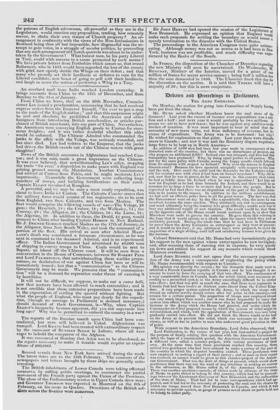An overland mail from India reached London yesterday. It brings
accounts from China to the 15th of December, and from Bombay to the 31st of January. From China we learn, that on the 26th November, Commis-
sioner LIN issued a proclamation, announcing that he had received express orders from the Emperor himself, "for ever to put a stop
to the trade of the English nation ;" and that this suspension might be real and absolute, he prohibited the Americans and other foreigners from introducing British merchandise, or articles pur- chased of British merchants, into any part of China. Nevertheless, the Americans were conveying English goods to Canton for enor- mous freights ; and it was rather doubtful whether this edict
would be enforced. The Chinese Admiral who commanded the junks in the affair with the Volage, was seriously wounded, and has since died. LIN had written to the Emperor, that the junks had driven the British vessels out of the Chinese waters with great slaughter!
News of the British successes in Afghanistan had reached Cans ton ; and it was said, made a great impression on the Chinese.
It was even believed, that notwithstanding LIN'S edict, stopping
the trade "for ever," a disposition to make peace with England was gaining ground among the Mandarins. Another Commissioner
had arrived at Canton from Pekin, and he might moderate LIN'S impetuosity. Meanwhile the Government were collecting large numbers of troops, and building fortifications on their coast. Captain Essior remained at Kongkoo. A powerful, and we may be sure a most costly expedition, was about to leave India for Canton. The Cakulta Courier states that
the military force would consist of ten regiments; six to be sent from England, two from Calcutta, and two from Madras. The fleet would comprise the following vessels of war—The Volage, 28 guns; the Hyacinth, 18 ; the Cruiser, 18; the Wellesley, 74 ; the Conway, 28 ; the Alligator, 28 ; the Childers, 18; the Larne, 18; the Algerine, 10. In addition to these, the Druid, 44 guns, would proceed to China after landing Captain Honsom in New Zealand. Sir J. IlnEmEn GORDON reached Madras on the 17th of January, in the Alligator, from New South Wales, and took the command of a
portion of the fleet. His arrival so soon after Admiral MAIT- LAND'S death was considered a fortunate circumstance, as he was next in command to the deceased Admiral, and is an experienced
officer. The Indian Government had advertised for 40,000 tons of shipping to convey troops to China. Coals would be sent to
Sapata, an island off the Chinese coast. It will be seen from a conversation in the House of Commons, between Sir ROBERT PEEL and Lord PAL:gins-fox, that notwithstanding these warlike prepa-
rations, no declaration of war against China has been or will be immediately issued ; but that a " communication " to the Chinese Government may be made. We presume that the "communica- tion" will be a demand for reparation under threat of exacting it by hostilities.
It will not be difficult, we suppose, to make out a wens belli, now that matters have been allowed to reach extremities ; and it
is not credible that these extensive preparations have been made in the expectation of settling the quarrel without fighting. But what the people of England, who must pay dearly for the expedi- tion, (though no message to Parliament is deemed necessary,) should demand of their Government, is—Why, when Captain Erzioes_incapacity became apparent, did you not supersede him long ago? Why was he permitted to embroil the country in a war ?


























 Previous page
Previous page